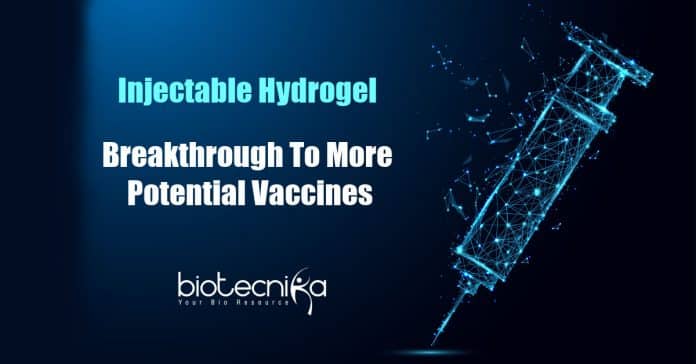Scientists develop injectable hydrogel – leading to more potential vaccines
The spread of several infectious diseases, such as smallpox, polio, and measles have been decreased using vaccines. But, for some diseases like HIV-1, influenza, and malaria, vaccines don’t work very well. This drawback may be due to the antigen and adjuvant presentation timing to the immune system of the body.
An injectable hydrogel that can release of vaccine components in a sustained manner and can enhance the potency, quality, and duration of immune responses in mice has been developed by researchers. The findings of the study are published in the journal ACS Central Science.
The researchers stated that this study shows a simple and effective vaccine delivery platform that improves the duration of antibody-mediated immunity and the potency of the vaccine.
Vaccines display parts of a pathogen, known as antigens, to cells of the immune system to confer resistance to infectious diseases, which develop antibodies against these antigens. The immune system quickly deploys antibodies to destroy the invader, if a vaccinated person gets infected with the same pathogen later. Additionally, vaccines normally carry a component, called an adjuvant, which helps in the immune system stimulation.
The body is typically exposed
to antigens for 2-3 weeks in natural infections, whereas in the case of vaccines, the exposure time is only 1-2 days.This newly developed injectable hydrogel can slowly release vaccine components over a longer period of time, like how the human body is used to, leading to increased immune response, and the research team included Eric Appel, Emily C. Gale, Gillie A. Roth, Wei Luo, Eneko Axpe, Rohit Verma, Marcela Alcántara-Hernández, Caitlin L. Maikawa, Anthony C. Yu, Hector Lopez Hernandez, Bali Pulendran, Qian Yin, Anton A. A. Smith, Mark M. Davis, and Juliana Idoyaga.
A polymer-nanoparticle hydrogel that could be mixed with vaccine components was developed by the researchers. Local inflammation was triggered when the vaccine was injected under the mice’s skin, which attracted certain types of immune cells. This helped in the gradual release of the antigen and adjuvant over many days.
The outcomes of the study revealed that, compared to the mice treated with a conventional vaccine, the mice injected with the hydrogel produced more antibodies over a longer period of time. Notably, the hydrogel-vaccine-treated mice produced antibodies having around 1,000-fold higher affinity for the antigen compared to those produced after receiving the conventional vaccine.
However, further study is required to check if this method improves vaccine protection from specific diseases.
Scientists develop injectable hydrogel – leading to more potential vaccines
Author: Sruthi S






























